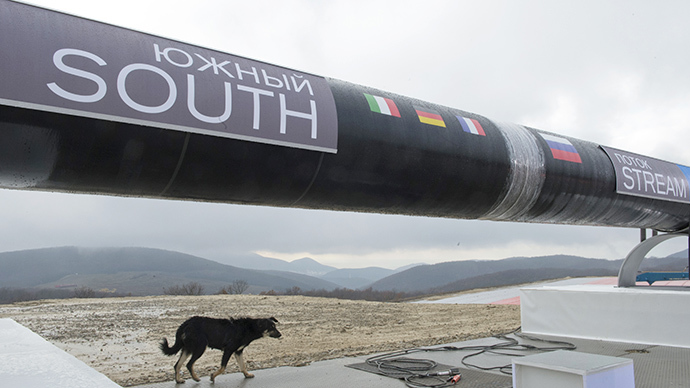
Gazprom Agreements on South Stream Breach EU Law; Bulgaria and Serbia Ask EU to Negotiate with Russia
Publication: Eurasia Daily Monitor Volume: 10 Issue: 220
By:

The construction of the South Stream natural gas pipeline was effectively put on hold after the European Commission (EC) announced that Russia’s bilateral agreements with Bulgaria, Serbia, Hungary, Slovenia, Greece and Austria were in breach of European Union law. Klaus-Dieter Borchardt, director for energy markets at the European Commission, told a meeting at the European Parliament on December 4 that the inter-governmental agreements must be renegotiated from scratch. The EC warned that if Russia refuses to renegotiate the contract conditions, the five EU member states and Serbia, which is a member of the EU-backed Energy Community, must suspend implementation of their agreements with Gazprom or will face heavy penalties (Capital Weekly, EurActiv, December 5; Duma, Sofia News Agency, December 6).
This is the first serious blow to the Gazprom-led South Stream gas pipeline, which will delay the project by months, or possibly years. The strong wording of the Commission’s decision also suggests that the project is unlikely to receive any special treatment or temporary exemption from EU rules, in line with what Russia partially obtained for Nord Stream.
Gazprom immediately responded that nothing could prevent the construction of South Stream. The Russian Deputy Energy Minister Anatoly Yankovski, who was present at the event in Brussels, stated Moscow’s official position: “Russia does not recognize Brussels’s right to apply EU rules and regulations to gas pipelines that pass through EU territory, if these originate outside of the EU.” Moscow considers trans-boundary pipelines subject to international law and, thus, Russia would not agree with the precedence of EU law in South Stream countries (EurActiv, December 5; Capital Weekly, December 8).
The EU has frequently advised Russia and its European partners that agreements on the construction of the South Stream pipeline should comply with the EU’s Third Energy Package regulations. But evidently these warnings have been dismissed. Three main issues have raised particular concern in Brussels. First, the so-called network ownership “unbundling” requires the separation of energy supply and energy network provision. Thus, a company such as Gazprom, which is both a gas producer and supplier, cannot own the transmission network or any storage facilities. However, currently, Gazprom has 50–51 percent ownership of the joint companies that will construct and own the pipeline. In addition, the EU requires non-discriminatory access of third parties to the pipeline, which Gazprom is not willing to allow. Finally, an independent operator, instead of the pipeline owner(s), should determine the transit tariffs.
On August 14, after reviewing all bilateral agreements, the European Commission sent official letters to the six European governments outlining its objections. On October 18, the EC held a meeting in Brussels with representatives of all South Stream countries, including a Gazprom representative, to reiterate that the bilateral agreements are not compliant with EU law and need to be renegotiated. However, Bulgaria and Serbia did not take heed and rushed to sign the final protocols with Gazprom, even holding formal “first welding ceremonies” at the village of Razovo in Bulgaria on October 30, and in the Serbian province of Voyvodina on October 31 (BTA, Sega, October 31; Standart News, November 24).
As a result, Sofia and Belgrade have found that their binding agreements with Russia contradict European rules. If the two countries disregard the Commission’s order, they will face infringement procedures and heavy fines. If they suspend the project, Russia might sue them for breach of contract and damages, just as it currently is suing Bulgaria for canceling the Belene Nuclear Power Plant project in 2012. Bulgarian member of the European Parliament Svetoslav Malinov commented that Russia and Gazprom are likely to continue exerting pressure on the countries involved in the project (Darik Radio, Mediapool.com, December 7).
The reactions of Bulgarian and Serbian officials show embarrassment and confusion in Sofia and Belgrade. Bulgarian Foreign Minister Christian Vigenin’s position was close to that of Russia’s Deputy Energy Minister Yankovski: “The construction of South Stream does not depend on the European Commission, but is a matter of agreement between Gazprom and some EU countries,” he told Bulgarian National Television (BNT, December 7).
Ultimately, both countries are throwing the hot potato back at Brussels, suggesting that the EU needs to intervene. “Bulgaria would welcome more active dialogue between the European Commission and Russia on South Stream,” says the official statement of the Bulgarian Ministry of Economy, Energy and Tourism (Darik Radio, Duma, Mediapool.com, Capital Daily, Dnevnik, December 6).
Serbian Energy Minister Zorana Mihajlovic also confirmed that the dispute should be resolved between the EU and Russia directly, and added that “a small country like Serbia cannot be expected to revise the agreements with Gazprom if this was not required of any other country” (RFE/RL, December 6).
These statements bear a striking similarity to the request of the Ukrainian President Victor Yanukovych after he declined to sign a trade agreement with the EU under Russian pressure. He asked for three-way negotiations among the EU, Russia and Ukraine on the future of his country’s relations with Brussels. But as in Ukraine, many in Bulgaria do not agree with putting the burden on the EU. Socialist member of the European Parliament Ivaylo Kalfin said that the government should have revisited the contract as soon as the European Commission alerted it. Brussels is likely to remain firm on upholding EU rules and not allowing Moscow or anyone else to bend them.




